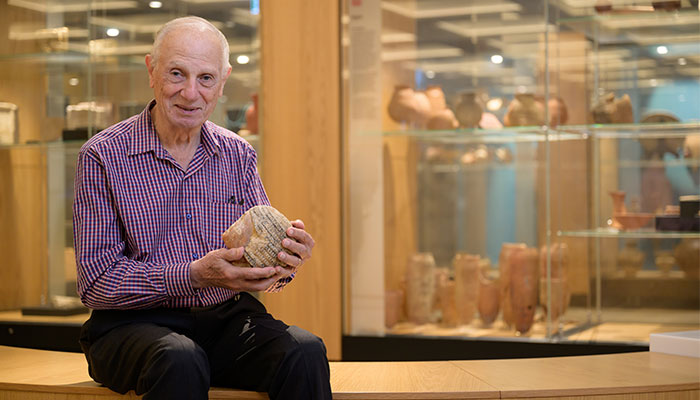"I am from Alexandria in Egypt. When I left school, the government at the time gave students intending to go to university a pass to visit all the ancient monuments in the country, staying free in youth hostels for up to eight weeks.
It was called the Know Your Country trip. I went on this trip and came back with an obsession that still hasn’t gone away.

A passionate life: Distinguished Professor Naguib Kanawati, pictured, in the Macquarie University History Museum. Image: Jesse Taylor
On that trip, and many times since, I visited the tombs of private individuals and became fascinated by the detailed scenes of their daily life drawn on the walls. I felt that these people were still living. I could feel their presence. The wall scenes show what they ate, their furniture and clothes, what sports they played – that is history.
I kept visiting them and studying these citizens of 4000 years ago and I am still doing that today.
Egypt was not the best country to be in at that time under President Nassar. I decided to leave. There were too many police and if you uttered one word of criticism, somebody would tell the authorities and you would disappear. I was exactly 27 when I left.
Egypotology did not exist here as a discipline so working in the Dunlop factory making tyres was my first job.
But 1968 to 1970 in Sydney were the worst two years of my life. I couldn’t study and I couldn’t get a decent job. My English was difficult and my two degrees from Egypt were useless because I needed to be fluent.
Egyptology did not exist here as a discipline so working in the Dunlop factory making tyres was my first job.
Then suddenly in 1970, after practically begging, I was accepted here at Macquarie with a scholarship. The university was so new there were not yet any graduates of Macquarie when I started my PhD. And only two buildings plus a library. I have seen our campus grow into one of the most beautiful campuses in the world.
Ultimately, I established the Department of Egyptology in the School of Ancient History (now the Department of History and Archaeology). I am proud of the fact that we are now so well regarded as a leading centre for Egyptology that the Ministry of Antiquities in Egypt sent one of their officials here to get a PhD.
The number of people studying Ancient Egypt and hieroglyphic language in Australia is far higher than in Egypt. Macquarie has 40 PhD students in Egyptology while the biggest Egyptian university would only have five or 10.
I taught hieroglyphs here for 40 years. A colleague from the UK’s University of Liverpool told me you could hold a hieroglyph class there in a phone box! And London is the same. Australians are more fascinated by Ancient Egyptian culture than the Egyptians. Why? I don’t know why!
For me, Macquarie is the last 50 years of my life. As a student, a teacher and a researcher, I was always the first to arrive and the last to leave. There is no-one who has practically lived here more than me."



